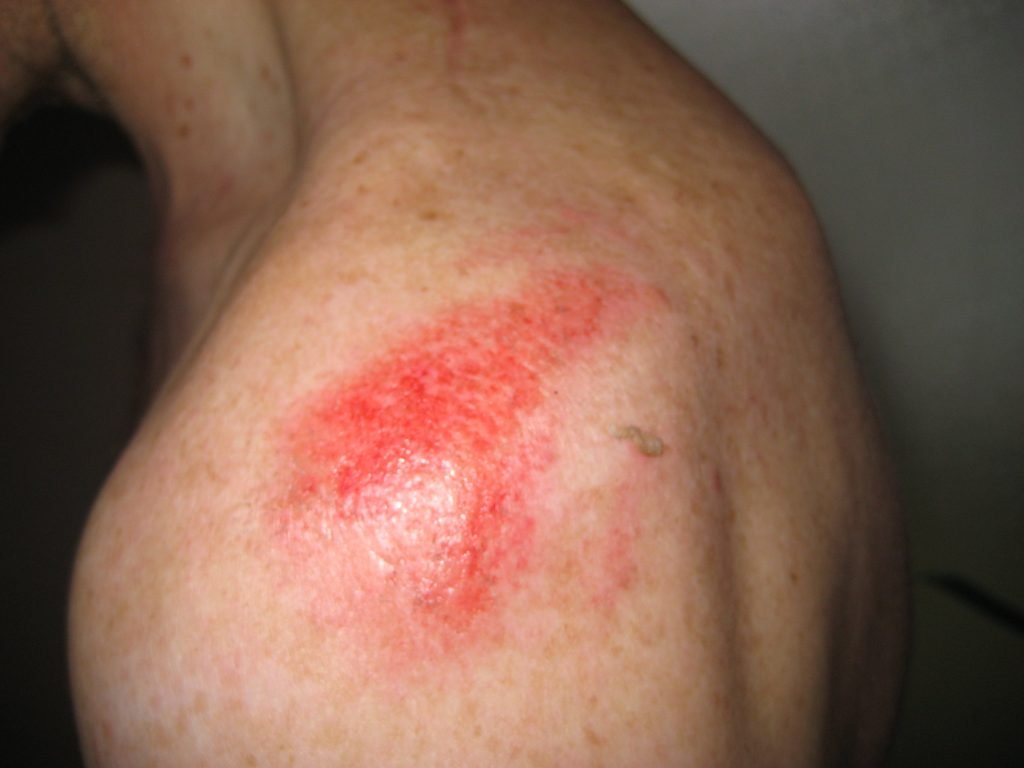
Last Updated on September 28, 2024 by Beth Skwarecki
Gout is a type of arthritis that causes inflammation, pain, and swelling in joints. It is most commonly associated with the joints in the feet and ankles, but it can also affect the joints in the hands, wrists, and knees.
While it is less common, it is also possible to get gout in the shoulder. This article will explore the symptoms, causes, and treatment options for Can You Get Gout In Your Shoulder.
Can You Get Gout in Your Shoulder?
Yes, gout can affect any joint in the body, including the shoulder. It is a type of arthritis caused by the build-up of uric acid in the joints, which can lead to inflammation, pain, and swelling. While the shoulder is a less common site for gout, it can still occur.
If you are experiencing pain, swelling, and inflammation in your shoulder, it is important to speak with a healthcare provider to determine the cause and get appropriate treatment.
Symptoms of Gout in Your Shoulder
The symptoms of gout in the shoulder can be similar to those of other types of arthritis and may include the following:
- Pain: Gout can cause sudden, severe pain in the affected joint. The pain may be constant or may come and go.
- Swelling: The affected joint may become swollen and tender to the touch.
- Redness: The skin around the affected joint may become red and inflamed.
- Limited range of motion: The pain and swelling associated with gout may make it difficult to move the affected joint.
- Fever: Some people with gout may also have a fever.
Causes of Gout in Your Shoulder
The build-up of uric acid causes gout in the joints. Uric acid is a waste product normally removed from the body through urine.
However, sometimes the body produces too much uric acid or does not excrete it effectively, leading to a build-up in the blood and joints.
Several factors can increase the risk of developing gout, including:
- Genetics: Some people are more prone to developing gout due to their genetic makeup.
- Diet: Consuming a diet high in purine-rich foods (such as red meat, seafood, and alcohol) can increase the risk of gout.
- Certain medications: Certain medications, such as diuretics, aspirin, and niacin, can increase the risk of gout.
- Medical conditions: Certain medical conditions, such as obesity, high blood pressure, and diabetes, can increase the risk of gout.
- Age: Gout is more common in older adults.
- Gender: Men are more likely to develop gout than women, although women’s risk increases after menopause.
Diagnosis of Gout in Your Shoulder
If you are experiencing pain, swelling, and inflammation in your shoulder, it is important to speak with a healthcare provider for a proper diagnosis.
Your healthcare provider will ask about your symptoms and medical history, and may also perform a physical examination of the affected joint.
To confirm a diagnosis of gout, your healthcare provider may also order one or more of the following tests:
- Blood test: A blood test can measure uric acid levels in your blood. High levels of uric acid can be a sign of gout.
- Joint fluid analysis: Your healthcare provider may remove a small sample of fluid from the affected joint and send it to a laboratory for analysis. The presence of uric acid crystals in the fluid can confirm a diagnosis of gout.
- X-ray: An X-ray can show the presence of uric acid crystals in the joint, although they may not always be visible.
- MRI or CT scan: These imaging tests can show the presence of uric acid crystals in the joint and may also be able to show any damage to the joint caused by gout.
If you are diagnosed with gout in your shoulder, your healthcare provider will develop a treatment plan to manage your symptoms and prevent future attacks.
Treatment of Gout in Your Shoulder

The treatment of gout in the shoulder will depend on the severity of the condition and the individual’s specific needs. Treatment may include:
- Medications: Nonsteroidal anti-inflammatory drugs (NSAIDs) such as ibuprofen and naproxen can help reduce inflammation and pain. Colchicine, a medication that helps rapidly reduce inflammation, may also be prescribed. For people with more severe or recurrent gout, medications called xanthine oxidase inhibitors (XOIs) may be prescribed to help reduce the production of uric acid in the body.
- Lifestyle changes: Making lifestyle changes, such as losing weight, eating a healthy diet, and limiting alcohol consumption, can help manage gout and prevent future attacks.
- Physical therapy: may be recommended to help improve the range of motion and strength in the affected joint.
- Surgery: In rare cases, surgery may be necessary to remove the uric acid crystals from the joint or to repair any damage caused by gout.
It is also essential to speak with your healthcare provider before starting any new medications or making any significant changes to your diet or lifestyle.
Duration of A Gout Flare-Up
A gout flare-up, also known as a gout attack, is a sudden onset of pain, swelling, and inflammation in a joint. Gout flare-ups can vary in duration, but they are typically most severe in the first 24-48 hours and gradually improve over several days to a week.
In some cases, a gout flare-up may last longer, especially if it is not treated promptly or if the underlying cause of the gout is not addressed.
Complications of Gout in Your Shoulder
If left untreated, gout can cause complications, including:
- Joint damage: Repeated gout attacks can cause permanent damage to the affected joint. This can lead to deformities, decreased range of motion, and difficulty with daily activities.
- Kidney damage: High levels of uric acid in the blood can lead to the formation of kidney stones and may cause kidney damage over time.
- Other health problems: Gout has been linked to an increased risk of heart disease, hypertension, and diabetes.
How Do You Prevent Gout in The Shoulder
There are several steps you can take to help prevent gout in the shoulder:
- Maintain a healthy weight: Being overweight or obese can increase the risk of gout. Losing weight and maintaining a healthy weight through diet and exercise can help prevent gout.
- Eat a healthy diet: Consuming a diet that is low in purine-rich foods (such as red meat, seafood, and alcohol) can help prevent gout.
- Limit alcohol consumption: Drinking alcohol, especially beer can increase the risk of gout. Limiting alcohol consumption can help prevent gout.
- Stay hydrated: Drinking plenty of fluids, especially water can help flush uric acid from the body and prevent gout.
- Take medications as prescribed: If you are taking medications to manage gout or other medical conditions that increase the risk of gout, it is important to take them as prescribed to help prevent gout attacks.
- Avoid injury: Injuring a joint, such as through sports or other physical activities, can increase the risk of gout. Taking precautions to avoid injury, such as wearing proper protective gear, can help prevent gout.
Other Conditions That Cause Shoulder Pain And Inflammation
There are several conditions that can cause shoulder pain and inflammation, including:
- Tendon tears
- Bursitis
- Tendinitis
- Osteoarthritis
#1. Tendon Tears:
Tendon tears can cause shoulder pain and inflammation. The most common cause is a rotator cuff tear, which occurs when one or more of the tendons that attach the shoulder muscles to the upper arm bone tear. Other tendon tears, such as a tear in the biceps tendon, can also cause pain and inflammation in the shoulder joint.
#2. Bursitis:
Bursitis is a condition that occurs when the bursae, small fluid-filled sacs that cushion the joints, become inflamed. It can cause pain and limited mobility in the shoulder, often caused by overuse or repetitive movements. Symptoms of shoulder bursitis include pain, swelling, stiffness, and weakness in the shoulder joint.
#3. Tendinitis:
Tendinitis is a condition that occurs when a tendon becomes inflamed or irritated, most commonly in the shoulder. It can be caused by overuse, repetitive motions, or a sudden injury. Symptoms of shoulder tendinitis include pain, stiffness, and limited mobility.
#4. Osteoarthritis:
Osteoarthritis is a degenerative joint disease that causes pain, stiffness, and inflammation in the affected joint. In the shoulder, it can affect the joint where the collarbone meets the shoulder blade or the upper arm bone. Symptoms of shoulder osteoarthritis can include pain, stiffness, swelling, and limited mobility.
FAQs
Conclusion
Gout is a type of arthritis that can affect any joint in the body, including the shoulder. To properly diagnose gout in the shoulder, a healthcare provider may perform a physical examination and order tests such as blood tests, joint fluid analyses, x-ray, or MRI/CT scans. Treatment options include medication, lifestyle changes, physical therapy, and in rare cases, surgery.

Beth is Cloudmineinc’s senior health editor and a certified personal trainer. She has over 10 years experience as a science journalist and is the author of two books. She deadlifts over 315 lbs.